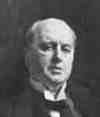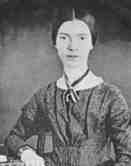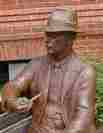|
How
We Spent Our Summer Vacations Ralph
Waldo Emerson |
||||
|
||||
by
Crossing the schoolyard last spring I have felt the perfect exhilaration of summer vacation; glad almost to the point of fright I ran to take my summer in those months which Providence has caused to fall between May and September; months which, if we but knew it, could be ours the year round. The schoolboy is the dwarf of the baby, and the summer is the unrealized giant of February. The richness and perfection of what we are pleased to call creation has its most rich and perfect realization in the summer. Even the corpse reaches more speedily its corpse-perfection in the hot months. The man who could raise his eyes from his ledger or news-paper long enough would be amazed at the order of the oversoul's plan: watermelon occurs not in the snows of December, when its coolness were redundant, but in the heat of July when it is most welcome. Similarly, hot chocolate ripens not at the Independence Day picnic when it would be anathema, but when its swirling steam can mockingly reflect the storm swirling without the cottage. Truly will we have come into our inheritance when we ourselves can be the cottage without which the storm swirls, be it winter or summer, watermelon or hot chocolate. In all these things, then, we can always say (provided of course that we live so that we might say these things) that I spent my summer vacation sacred in the integrity of my spontaneous impression, half expressing myself and half impressing myself and half expressing my impressions; and to the soul small enough to object to three halves, let me say that the smallest whole certainly must contain more than three halves, else all were partial. It were good for a man to be warm in the summer, for if he were not, how would he know to be cold in the winter? I heard a poet say that Bombay and the freighted riches of the orient were at naught beside a Yankee pond and a string of bluegills. Therefore is Summer, and therefore is Man. |
||||
by
Well, you know how it is when it's a summer and you're fishing and swimming off Bush's bar and playing pirate and soldier and maybe raising a baby bird which got hove out of the nest and all of a sudden it's like you're slapped in the face and realize that vacation's almost over. That's how it was with me when me and Buck Harkness got back from the cave with his old busted straw hat on. It was July and Buck says, "Sam, it's almost August and then we got to go back to school." Well, that fetched me, sure enough. For a minute I just set there and wished there wouldn't ever be no more of school at all. But I thinks a minute more, the way you do, and I says to myself, hold on; s'pose it was summer all year long and you never had to go to school at all?—would you feel better than what you feel like now? H--k no, I says; I'd feel guilty about takin' pleasure when there's folks in the world killing themself; plus what fun is vacation if you don't know what school's like to make it matter? Well, then, says I, what's the use of you taking a summer vacation if you're just gonna think about nothing but how it's gonna end? So I reckoned I wouldn't bother no more about school coming, but just latch on to whatever was fun and live like I was born in a castle or something, which I did and which is why this paper is late and there ain't nothing more to write about and you are probably rotten glad of it, what with having to read so many of them. The end, sincerely, Sam Clemens. |
||||
How I Spent My Summer Vacation by
|
||||
|
by Walter Whitman, American student, in my Twelfth
Year &
And the
fish became part of this child: tench, bream, sunfish, crappie, bluegill,
bass,
|
||||
HOW JAMES SPENT HIS SUMMER VACATION by 
ames' first question, when he reached Scout Camp, was about his books; yet on his learning that not all of the tomes with, or, one might say, by which he was wont to beguile his unoccupied hours had made, so to speak, the journey with him, he was not, he was surprised to discover, especially upset. It was not, he realized, as it might have been said to have been during the years of his youth, or, as he preferred to think of it, his relative youth, when he might reasonably have been expected, we might have it, to behave unreasonably; indeed, he found less impulse to irrationality and tantrum now than at perhaps any point prior to this, his penultimate one before plunging, as it were, into the depthless pool (not the one literally at the east end of the camp, of course; but, rather, that one figuratively waiting at the east end of one's summer existence) of that existence typical--or not; he could not say with knowledge or, even, with that certitude born of that arrogant ignorance characteristic of certain personalities both within and without the polite social order--of twelve year old boys at Camp or, for all he knew, elsewhere. Be those things as they might, James knew--though, indeed, he could scarce say how he knew that he knew--that he would be able, perhaps even easily able, to adjust to an abridged, as it were, a truncated and bowdlerized style of life without the comfort and, more, the uplift, which had been his as a result of his regular perusal of and interaction with his library. Particularly, he reflected, scarcely cognizant of the counselors and custodial help lining his route along that eastern-edge lake and towards the undistinguished architecture of the grouping of tents known as Dirty Arm, would he miss his copy of the latest number of Davy Crockett's Almanac, though he had in addition, though he scarce acknowledged the fact even to himself even in those moments of "brown study" to which he had increasingly found himself prone these last months beyond his having achieved the age of twelve, become rather fond of a new volume, calf-bound, called Uncle Ducky's Big Day. The volumes, erstwhile companions, even friends, though they might have been, were absent, and our young Henry contrived as best he might to "get by", as an American comrade put it, without them. To that end, an end which of course was no end, but, rather, an interregnum, he played at Capture the Flag and Relay Races but, rather shockingly to his, he would be the first to admit it, fragile ego, he was prohibited by the Camp director from participating in the telling of tales around the camp fire, the director explaining that simple "I want my liver!" contes were infinitely to be preferred over two-volume--which is to say, two camp fire--investigations into what James' brother called the "psyche-study" of participants in the events which were retold at so shallow a level during those fire-lit evenings; when, James reflected moodily but without so much as a trace of that bitterness which would not have fit his generous spirit, the campers were informed of the activities of Hook Man without having so much as a hint as to the effects of those activities upon the further social development of the other participants in the adventures. Vowing to rectify at the earliest possible moment available to him for inditing more satisfying accounts of the real significance of those moments preserved in camp-fire tales, James settled amiably back with the almost stereo-typical thrusting outward of length of leg which so marks the transatlantic breed and began contemplating ways by which he and his mates might most effectually effectuate the raising of their counselor's underwear up the flagpole. |
||||
|
by
t was summer, and according to his invariable custom Norris spent the months lying stupidly on the banks of a dry creekbed behind his house. The birds made lovely song in the rich foliage of the July-rich trees, but he was too hopelessly stupid to appreciate his surroundings. Late in the afternoon he would fall asleep, his mouth hanging idiotically open and his grimy bare feet twitching like the paws of a dreaming dog. Like the stagnant pools of a depraved city's open sewer, the
|
||||
A
SUM:MER
|
||||
How I Spent My Summer Vacation by
For some it was not a good summer. For my friend Nick there was summer
school. Afterwards there were exams and grades. It got nasty and he
hated his pencils. It would have been all right if there had been
wine, but we were twelve and the wineskins were full of lemonade.
He knew it would be all right if he could fish. Fishing would make
it all right. He wanted to fish more than he wanted to use the pencils.
It would be all right if he could fish, truly and cleanly fish. The
true clean
P.S.: Mrs Hansen I have been working real hard to remember about not writing all those run-on sentences did I do better this time? |
||||
earily recapitulant, the days spiraling in concentric retrograde, snatched backwards in the very instant of their birth beneath the repudiation of the earth-spurning tennis shoes of that soul damned--no, not damned, not even doomed: just fated—fated by the long slow fecundity of the Mississippi summer and by his own invincible and furious left-handedness so that even in the moment of its generation each motion seemed rushing to be its own negation; fated, then, in the summer's burning apotheosis and the unregenerate lefthandedness to the endless repetition of those motions, those gestures, those shadows and reflections of the unacknowledged because unrecognized desire to translate whole and untransmogrified the perfection of The Peach, as though in the moment of its
|
||||
|
||||







